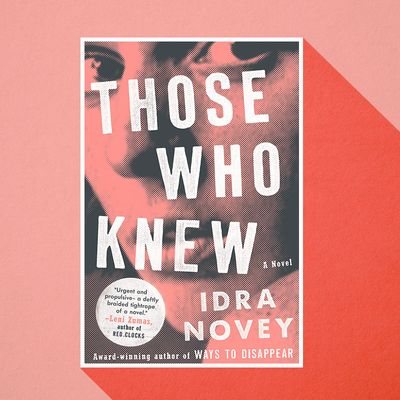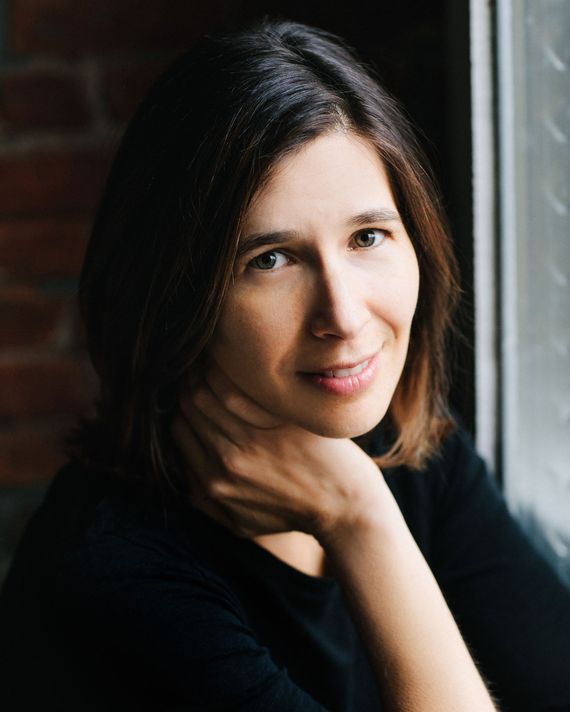
At the beginning of Idra NoveyÔÇÖs propulsive second novel, Those Who Knew (out this week), Lena, an activist and professor in an island nation recovering from dictatorship, shows up at her friend OlgaÔÇÖs bookshop with a sweater she found in her apartment. It looks exactly like the one a young woman named Maria was wearing when she was fatally run down by a bus. The clue prods Lena to explore her own suspicion that her ex-boyfriend Victor, a powerful up-and-coming liberal-darling senator, pushed Maria into the road. Lena knows from personal experience that Victor is prone to violence. She may be crazy, she admits, but sheÔÇÖs certain thereÔÇÖs more to Victor than his spotless public image.
Conceived and written years ago, this is a #MeToo novel avant le hashtag ÔÇö evidence that the specter of powerful men who abuse others while posing as champions of the people was haunting women long before we learned about Harvey Weinstein. Novey is acutely sensitive to political movements ÔÇö and refreshingly open about being a political writer. But while Those Who Knew probes institutional misogyny, domestic abuse, U.S. interventionism and the politics of the American ego, itÔÇÖs never polemical. She talked to Vulture about her charming villain, fiction as a tool in the hands of the oppressed, and pot as self-care in the age of Trump.
At the heart of Those Who Knew is the puzzle of Maria, whom we donÔÇÖt get to know. Your first novel also dealt with a missing woman. What speaks to you about this trope?
One powerful thing about writing fiction is that you get to write back to the narratives that we hear and the narratives that we donÔÇÖt. Historically, it is the erased lives of women that we havenÔÇÖt heard [about]. When you have this woman whoÔÇÖs sort of a cipher, it pulls you in as a writer to fill in that silhouette. I thought a lot about whether to go into MariaÔÇÖs narrative, or whether maybe it was more powerful and better mirrored the emotional landscape weÔÇÖre living in to leave it undefined.
As a reader or a TV viewer, do you find yourself really interested in ÔÇ£dead girlÔÇØ plots?
If IÔÇÖm gonna watch dark TV, I think it would be more like Black MirrorÔÇöIÔÇÖm a huge Black Mirror fanÔÇöor Stranger Things. IÔÇÖm so addicted to House of Cards. I made it to the end.
YouÔÇÖre it. YouÔÇÖre the only viewer.
I could not get enough of that insane show. Just thinking about how politicians get away with things. Theres a dead writer in House of Cards, you know? She ends up kind of haunting that show. Im not saying I was borrowing from House of Cards, but I thought it was interesting who was visible and who wasnt. And I think it would be foolish as a novelist to say that you are not aware of how these TV narratives are impacting storytelling. Unless youre in a cave.
ItÔÇÖs a pretty timely moment for a book explicitly dealing with powerful, abusive men. But you started this novel years ago.
My earliest notes go back to 2014. I come from about an hour away from Steubenville, Ohio, and the Steubenville rape case got me thinking about how people in power justify doing nothing. I think those are the insidious forces of patriarchy. I wrote the third section of this novel after the wrecking ball of the 2016 election, and I think that one of the things we do in fiction is to imagine kinds of justice that you do not see happening around you. This novel became a place to do that. I started to fantasize about the kind of candidate that I wanted to see on a ballot with Olga, who steps forward and puts her name down to run for public office. It was astonishing and beautiful to see women all over America not just fantasizing about it ÔÇö they put their names down on the ballot.
And some of them won this week. Lena is a victim of domestic and sexual abuse. She sees herself as both a victim and a witness, coming forward to protect other women.
You write the novel you canÔÇÖt find. `What I wanted to explore with Lena is how [her] sense of her familyÔÇÖs complicity in the [old] regime plays out in her sexual relationships and in her confidence professionally. Victor leverages her shame to encourage her to put herself at risk, and then he leverages it to keep her silent. SheÔÇÖs in this trap where sheÔÇÖs screwed if she speaks up and screwed if she doesnÔÇÖt.
I think a lot of people feel that way about speaking up about assault. But everybody has to do the math in terms of who benefits ÔÇö and the ways that speaking up could actually undermine your own life or the lives of others. ItÔÇÖs not always clear what is the best choice of action. Look at Christine Blasey Ford. She stepped forward after so many years as an act of civic duty. IÔÇÖd say that my best way to respond is within the world of a novel.
So you see writing as a political act?
I do. I think that sometimes we think women writers owe their personal experience to the audience. Do I draw on my individual experience? Of course I do. But I also draw on other things. Sometimes we can undermine our writing, especially as women writers, by saying that everything comes out of individual experience. I think fiction and world-building come from more than that, and that I donÔÇÖt want my work reduced that way.
We never find out exactly where Those Who Knew is set. YouÔÇÖve spent a lot of time in South America ÔÇö writing about it, translating authors. Did you have a specific place in mind?
What I love about political imaginaries is how they allow for me and also for the reader to bring what you know to the novel. ItÔÇÖs been fascinating to hear from readers who recognize aspects of the Dominican Republic, or Cuba, Haiti, Jamaica, Korea, Iran, Chile, Brazil.┬áI would say right now our country is functioning like an island nation ÔÇö looking at the insular, inward-facing political climate. So, in some ways I see the island world that I created as pockets of island nations within our country.
Personally, itÔÇÖs been really painful to see whatÔÇÖs happening in Brazil with Bolsonaro. HeÔÇÖs completely borrowed TrumpÔÇÖs playlist. ItÔÇÖs particularly scary because Brazil had a dictatorship [between 1964 and 1985]. Like the island in the novel, it had a transition into democracy. [Then] the WorkersÔÇÖ Party in Brazil was in power, and because of corruption scandals within the party, now here we are with this right-wing fascist in the presidency.
That makes me want to talk about Victor, the ÔÇ£villain.ÔÇØ HeÔÇÖs charismatic and adored ÔÇö to all appearances a liberal whoÔÇÖs going to free the people from the clutches of corruption.
ThatÔÇÖs why it felt necessary to put in clips from the media in the novel, so that you can see whatÔÇÖs at odds between the public narrative and someoneÔÇÖs private behavior, and how you can be this polished public figure and be an incredibly depraved, violent figure in private. Look at our own [disgraced New York Attorney General] Eric Schneiderman. There he is working on legislation against choking, and then there were all these allegations of inter-partner violence in his private life. I just found that so devastating,
YouÔÇÖve published poetry and short stories and translated books. Do you think the novel is the most persuasive of those categories?
What I love about the novel is that I can take all these other genres and bring them together, because the novel has a kind of elasticity.
Scenes from plays written by one of the characters are interspersed between chapters, and thereÔÇÖs nothing subtle about them.
Well, I donÔÇÖt think that the theater of politics weÔÇÖre watching is particularly subtle. It has a vaudeville quality to it. There are stomping villains, and they seem aware of their villainous qualities. TheyÔÇÖre almost relishing their villainy. I think the absurd theater of politics is what led me to actually want to put absurdist theater into the novel.
How are we meant to read the only American character, Oscar, whoÔÇÖs more ignorant than evil?
Oscar became this effigy in a way. He is reckoning with his profound ignorance of his countryÔÇÖs role abroad, and heÔÇÖs stumbling into it the way I think many of us stumble into knowledge of what the U.S. has done in other countries. I was in Panama on a day when everything shuts down to remember students who protested the U.S. occupation of the Panama Canal and were killed. I started to realize the giant lack of knowledge that most Americans have about the history of our interventions abroad.
Not to spoil anything, but heÔÇÖs on the island nation on September 11. And we see his sense of entitlement ÔÇö mourning for his country among these people who have been living in their own hellscape.
Yes. He has to confront his sense of whose tragedies take center stage, and which countriesÔÇÖ tragedies are happening on the sidelines.┬áWhat I love about fiction is how when you write from different charactersÔÇÖ point of view, youÔÇÖre writing toward peopleÔÇÖs blind spots. OscarÔÇÖs blind spots were really interesting to me because, of course, theyÔÇÖre my own blind spots.
There is a lot of pot in this novel. People are just smoking pot, selling pot, reeking of pot. I was just curious 
Was this a marijuana-induced book?
Well, pot is almost a form of self-care in the novel. ItÔÇÖs a community thing, right? ItÔÇÖs a happy-maker.
Maybe I was reading too many articles about medical marijuana dispensaries. I was fascinated by the role theyÔÇÖve taken on in our country. I havenÔÇÖt gone to many of them, but itÔÇÖs fascinating to hang out in the parking lots of dispensaries. People are really friendly! So, I guess I do have an interest in the role marijuana plays in the 21st century. ItÔÇÖs true, I admit.
Appealing to the stoner crowd seems like a sure-fire way marketing move, if nothing else, right?
It may be that the more you overdose on news, the more you are then seeking some sort of self-medicating options to counteract it. I just think that I have watched this take on a more prominent role in the lives of many of us. IÔÇÖm just saying.
Okay. I got it. YouÔÇÖre an intellectual witness.
I am an intellectual witness. I have two small children, so one has to be careful of what you can say. Or when your kids are older theyÔÇÖll be like, ÔÇ£Mom, I read all those interviews you gave about what a pothead you were.ÔÇØ


